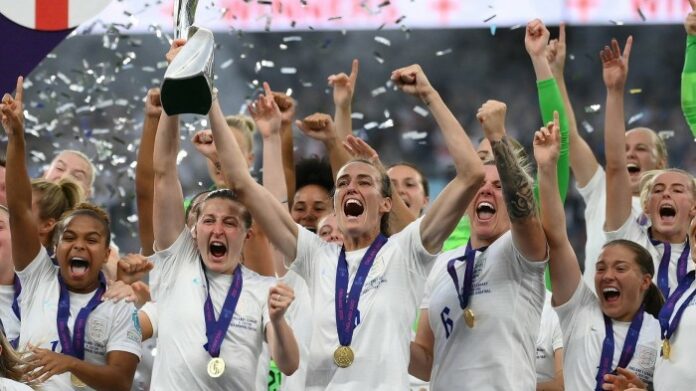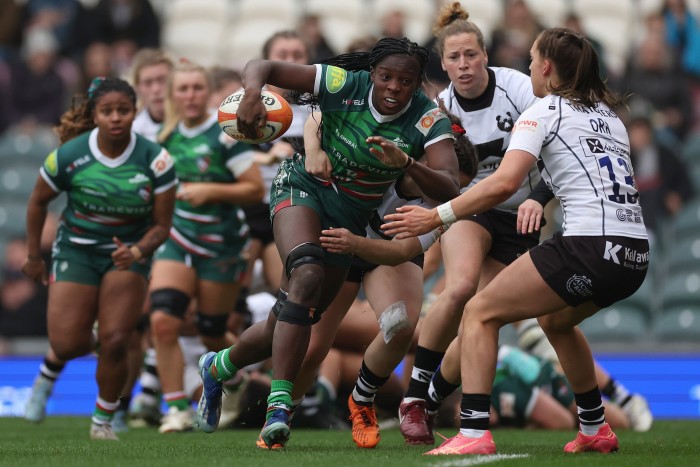
[ad_1]
When England’s Lionesses won the European women’s football championship in 2022, swaths of the country erupted in celebration. Wembley was packed out, and 365mn people tuned in around the world. Football Association chief executive Mark Bullingham described the final as “a historic sporting moment”.
The following season, Women’s Super League match attendance almost tripled and an additional 2.3mn women and girls started playing football in England, according to governing body Uefa.
Now, England’s Red Roses, the national women’s rugby team, are strong favourites to mirror that success next year in the Rugby World Cup, which England is hosting.
“Our main vision is creating a generational moment for women’s rugby,” says Sarah Massey, the competition’s managing director. World Rugby wants to use the tournament to boost grassroots participation in the women’s game, as well as to attract a new generation of fans.
In rugby, as in other sports, the women’s game is growing — with attendance records broken worldwide in 2023. World Rugby is hoping to harness this excitement for the 2025 World Cup.
The signs are promising, with early ticket sales showing record demand. The first batch for the final at Twickenham sold out within hours in September. “They are going like hot cakes,” says Massey, describing “unprecedented” interest.
World Rugby has an ambitious slate of legacy work planned around the tournament. “Our goal is very much around increasing participation, increasing our number of people following rugby,” explains Massey. Upgrading facilities and training new coaches and officials are all key parts of the UK government-funded Impact ’25 programme.
Sarah Massey, managing director of Women’s Rugby World Cup 2025, at a ticket launch © Dan Mullan/World Rugby via Getty Images
Impact Beyond 2025, a separate programme, looks beyond England to increase participation worldwide. Plans include career development schemes to bring women into jobs in rugby, funding 5,000 girls globally to play, and embedding content creators in World Cup teams to reach more viewers.
But securing commercial partnerships will be essential for building this kind of legacy. And, in this arena, rugby has its share of challenges.
“There are so many problems,” says Christina Philippou, about the financial state of rugby. Philippou is a professor in accounting and sport finance at the University of Portsmouth, and a contributor to the Leonard Curtis Rugby Finance Report, which reveals the sustained lossmaking trend of Premiership Rugby in England, as the clubs carry big debts.
Some of this is historic. “Rugby came late to professionalisation of the big team sports, which meant that it was late to get the broadcast cycles,” points out Philippou. “Then, when clubs or leagues or a sport aren’t doing so well, there tends to be a movement towards short-term financial gain by going behind paywalls.”
Recommended

She says that creates problems since the sport needs “eyeballs” to attract sponsors. This means that “generally, there are fewer buyers interested in rugby”.
For next year’s World Cup, the BBC has secured exclusive UK broadcast rights, including live coverage of every match. Philippou believes the growing popularity of women’s rugby will mean sponsors realise they can reach different demographics.
“You’re seeing that in football clubs,” she says, noting that sponsors are “starting to be interested in clubs that have both men’s and women’s teams, because they see that as an opportunity to invest in a single brand but have access to two different markets”. By this, she means the “mature” market of the men’s game and the “start-up” nature of the women’s.
In football, Philippou points to Arsenal women’s partnership with make-up brand Il Makiage and Sunderland’s shirt sponsorship deal with baby brand Nuby — both valuable propositions born from the sudden growth of the women’s game.
 Women’s rugby team Leicester Tigers are seeking investment © Matthew Lewis/Getty Images
Women’s rugby team Leicester Tigers are seeking investment © Matthew Lewis/Getty Images
“There is some evidence that rugby is going in that direction,” she says. Leicester Tigers women’s team is seeking a principal sponsor to “catapult” its programme and is asking for a six-figure annual commitment.
Philippou reckons that World Rugby is “going about it in the right way” in how it is marketing the World Cup. Capgemini, Mastercard and Mitsubishi Electric are among the partners that have confirmed their involvement.
“It’s certainly a really growing sport that’s getting a lot of attention, so that’s where we expect to have some good . . . primed exposure,” says Hans-Joerg Hinkel, Mistubishi Electric’s head of communication and sustainability for Europe, the Middle East and Africa.
For Guinness, a brand with long-standing partnerships in rugby, deeper involvement in the women’s game is commercially attractive. “We know there’s a growing audience in women’s rugby, which is one of the reasons we’ve invested in it,” says Paddy Carberry, Guinness global marketing manager. “This isn’t small any more . . . this is mass market.”
He adds: “The attractiveness of it as a commercial venture for any brand is certainly growing. There are more brands competing for that space and that share of voice than ever before.”
Creating the “generational moment” that Massey describes is one thing, but the real test will be in sustaining that momentum.
“It’s not just about that one push,” says Philippou, pointing out that attendance at football matches in the Women’s Super League, which soared to record highs immediately after England’s Euro 2022 victory, has waned this season.
“How do you get the commercial sponsors in, how do you push the broadcasting angle better, how do you get people attending day in, day out . . . and how do you ensure that [it] is long term?” she asks.
“You need this to build into something that remains at that level.”
[ad_2]
Copyright for syndicated content belongs to the linked Source link

